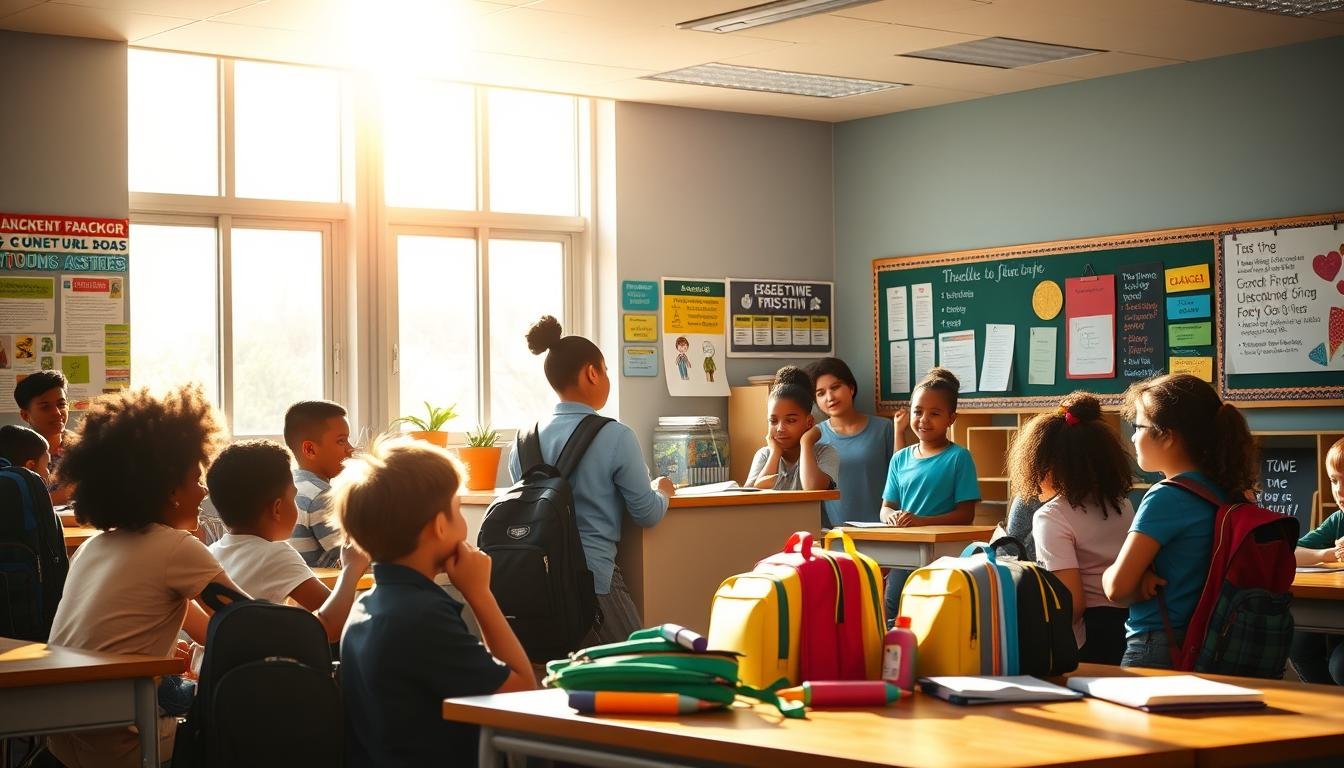Ever wondered why some kids switch from summer to school so easily, while others have a hard time? As summer ends and the school year nears, this change can be tough. It’s especially hard for kids with special needs. But with the right tips. you can prepare kids for back to school easier.
Being ready for school means giving both emotional and practical support. Your child should feel understood and ready for new routines. Getting back into school habits after summer needs patience and help from others. Let’s look at ways to make this big shift a good one for your kid and you.
Don’t Let Return to School Sneak Up on Children
Summer ending means kids need to get ready for school again. Moving from fun times to a set schedule is tough, especially for kids with special needs. Slowly getting them used to the idea helps them feel less stressed about going back.
Using a visual calendar to count down to school is a great tool. It helps kids see exactly how many days left of summer they have. This helps them feel more secure and ready for what’s coming.
Adding a daily countdown with activities or talks about school is another good tip. It makes the wait fun and teaches them what to expect. This way, kids with special needs can better handle the new school year.
Getting Back on a School Sleep Schedule
As summer ends, it’s important to help our kids get back to a school sleep schedule. This can really help with their thinking and feelings. The American Academy of Sleep Medicine says slowly changing sleep times is key for kids’ sleep health.
To make it smoother, start putting them to bed 10-15 minutes earlier each night. Here’s how to get your child back on a school sleep schedule easily:
- Try calm activities before bed, like reading or coloring, without screens.
- Have a regular night routine, maybe a warm bath or shower.
- Make sure the bedroom is cool, dark, and quiet, for the best sleep.
- Stay away from big meals and caffeine before bed. Pick light, healthy snacks instead.
Using these tips, we can help our kids develop good sleep habits. This means they’ll be rested, eager, and ready for school.
Communicating About the New School Year
As a new school year begins, it’s crucial to talk openly with our kids. This helps lessen their worries and boost their excitement. Chatting about their classes, new teachers, and favorite school activities can make them look forward to school.
It’s also important to talk about any concerns or fears they may have. This can show where they might need some help. For example, going over their IEP goals or language skills can help prepare for a smooth year. Remember, talking effectively with our kids is essential for their success.
Making welcome calls to families is a great first step. It’s an excellent way to share key school rules and what’s expected. And it’s crucial to make sure everyone can understand these messages, even families who speak other languages. Apps like TalkingPoints can help translate, so no one feels excluded.
For children with special needs, connecting early is key. It’s vital to talk about their goals and when they’ll get certain services. Taking this step early builds a strong support network for their learning journey.
- Review cumulative files and IEPs
- Make welcome calls to families
- Facilitate translated communication where needed
- Engage early with families of special needs children
These steps help kids and families get ready for school and set the stage for a year full of learning. For more tips, dive into this helpful resource.
Preparing Kids for Back to School
Switching from summer fun to school routines is tough. It’s even harder for kids with special needs. Our community knows preparing for back to school is important for a smooth change. We can make learning plans to help our kids do well. Here’s how to do it.

Start by going over last year’s lessons. This refreshes important knowledge and builds confidence. Setting clear, achievable goals is also key. Talk about these goals with your child, like getting better at reading or math.
Use fun learning tools to fight the summer learning dip. Games and learning apps can make this fun. Add them to daily routines to smooth the move back to school. Little steps every day can lead to big improvements.
Make starting school exciting. Go shopping for cool supplies or have a party to say goodbye to summer. These things can make your child look forward to school.
By taking these steps, you help your child get ready for school well and supportively. We, as a community, can use these ideas and help each other. Together, we make the school journey better for everyone.
Reconnect with School Friends
As a new school year nears, it’s key to make the transition smoother for our kids by reviving friendships. Kids need to learn how to interact with others, especially those who get nervous around people. Helping them meet up with friends again can make going back to school easier.
Setting up play dates or small get-togethers before school starts can really help. These moments make kids feel less scared about school. They know they’ll see friends there.
Here are some cool ways to get kids back in touch with school buddies before classes start:
- Host a back-to-school party where kids can gather and catch up on their summer adventures.
- Arrange casual playdates in local parks, providing a relaxed environment for social interaction.
- Encourage kids to join community sports or club activities that involve their school peers.
- Organize virtual meetups for friends who may be traveling or relocating, ensuring they stay connected.
By doing these things, we can help make starting school again smoother and happier. Focusing on getting kids together early can build strong friendships. This way, kids feel ready and excited for the school year.
Think about having these gatherings regularly so kids always have a way to work on their social skills. Continuous meetings help with an easy switch back to school. They create a caring place where kids can get better at making friends.
Buying School Supplies and Clothing
Getting ready for school by picking out new supplies and clothes is fun. Including kids in these choices gives them control and boosts their self-esteem. It’s important for us, the parents, to use smart shopping tips to make everything easier and more fun.
- Create a checklist of necessary items to ensure nothing is forgotten.
- Allow children to pick out their favorite supplies and clothing, which can boost their excitement for the upcoming school year.
- Shop at sales events or use coupons to manage costs without compromising on quality.
- Encourage kids to personalize their supplies—this adds a touch of individuality and fun.
Preparing school supplies together creates team spirit and excitement. With good planning, shopping for school can be a special time that helps everyone get ready for a great year ahead.
Creating a Dedicated Study Space
Creating a study environment for kids is very important for their school success. This is especially true for kids who need extra support. A calm, tidy, and welcoming space helps kids concentrate better on homework. Here are some easy tips to help your child study better at home.
- Create a Quiet and Cozy Corner: Picking a quiet spot at home can really help. Whether it’s a whole room or just a cozy corner, it should be where your child can study with fewer distractions.
- Quality Sound-Canceling Headphones: Good quality sound-canceling headphones can block out noise. This is helpful in noisy places.
- Proper Lighting: Make sure the study area is well lit. This helps prevent your child from getting tired eyes and keeps them alert. Good lighting boosts productivity and helps them stay focused longer.
- Involve Your Child: Letting your child help set up their study area can make them feel in charge and responsible. They’re more likely to use it well.
Keeping the study area organized is crucial. Having everything your child needs close by means less time getting distracted. Using colors to organize work and a visual timer can help too. These make studying at home better planned and more helpful for your kid.
For more tips on home study setups, try adding these ideas to your child’s study area. It can really help them focus and do well in school.
Maintaining Healthy Habits
As a new school year starts, it’s key for your child to keep up healthy habits. Creating good routines for kids supports their physical activities, proper nutrition, and staying hydrated. These are all important for their brain and emotional health.
To begin, ensuring kids eat balanced meals is crucial. Include a mix of fruits, veggies, grains, and lean meats in their diet. Having regular times for meals and snacks adds structure to their day. Letting kids help with meal prep makes them more likely to enjoy healthy foods.
Drinking enough water is very important too. Kids should have water all day, especially when they’re active. Skip the sugary drinks to avoid energy drops and poor focus. Regular exercise like playing sports or even dancing boosts their health and lowers stress.
Here’s a simple guide for daily health habits you can add to your child’s life:
| Habit | Frequency | Benefits |
|---|---|---|
| Regular Physical Activity | Daily | Improves fitness, reduces stress, boosts mood |
| Balanced Diet | Every Meal | Optimal brain function, stable energy levels |
| Consistent Meal Times | Daily | Creates stability, improves digestion |
| Proper Hydration | Throughout the Day | Enhances concentration, prevents fatigue |
By keeping these tips in mind, we can help our kids grow academically and emotionally. This prepares them to face the new school year with excitement.
Handling First-Week Jitters
Starting a new school year can feel scary for kids, especially those with special needs. The first week often mixes excitement with worry. Let’s look at ways to help them adjust more easily. Managing school anxiety is possible with some comforting actions designed just for your child.
Start with a calming morning routine. Encourage your child to try simple breathing exercises or mindfulness before school. These methods can make jitters less intense and help them feel in control. It’s also key to have a plan for seeking help if things get too tough. Help them find a teacher or counselor they’re okay talking to during the day.
Talking about the week ahead is very important. Go over the schedule, what they’ll do each day, and who they’ll see. Make it clear it’s okay to feel unsure and remember times they’ve done well before. This kind of talk is very supportive for kids who are nervous.
Acting out situations they might find at school can also help. It could be about finding their classroom, talking to other kids, or what to do at lunch. Getting ready this way builds their confidence and eases worry. They practice dealing with new things before they happen.
Last of all, keep up these helpful strategies. With care, understanding, and practice, first-week fears can become less scary. This makes starting school a more positive experience for the whole year.
Encouraging Positive Mindset and Goal Setting
Getting back to school after summer can be tough for kids. As parents, it’s important to help them think positively and set clear goals. This way, they can better deal with challenges.
Goal setting is a key part of education. When kids set their own learning goals, they take charge of their success. Begin with easy goals like finishing homework on time or reading a new book each week. Celebrating these wins boosts their positive feelings and pride in what they do.
Creating a safe space for kids to share their feelings is vital. When they hit a bump, show them it’s a chance to learn. This teaches kids to tackle problems with hope and courage.
Let’s look at some examples to show how goal setting and positivity help in school:
| Goal | Action Plan | Outcome |
|---|---|---|
| Improve Math Grades | Practice 30 minutes daily | Increased confidence and better understanding of concepts |
| Read a Book Every Month | Set aside 20 minutes of reading time each day | Develops a love for reading and better comprehension skills |
| Complete Homework on Time | Create a daily homework schedule | Enhanced organizational skills and reduced stress |
By backing a positive mindset and goal setting, our kids can start the school year off right — with confidence and excitement. It’s key to applaud their efforts and grow from any mishaps. This doesn’t just boost their grades but gets them ready for life’s hurdles too.
Involving Kids in Preparing for School
As the new school year gets closer, we can help our kids get excited and responsible. Getting them involved in preparing for school is key. It helps them learn important skills and makes them eager for school to start.
Letting kids manage their school items is empowering. They can organize their pens, put names on their notebooks, and pack their bags. This makes them feel proud and responsible for their stuff.
Planning their weeks together is also beneficial. Together, mark important school dates on a calendar, like due dates for projects and club meetings. It’s great for learning to manage time and plan ahead.
Here’s an easy way to begin:
- Make a list of needed school supplies
- Set aside specific times for homework and studying
- Include time for breaks and fun
Getting kids involved in these steps boosts their independence and readiness for school. By making them part of school prep, we help them embrace their education with confidence and joy.
Build a Routine Before School Starts
Preparing for a new school year means making a plan for daily tasks. It’s key to build a routine for kids. This helps them shift from a fun summer to a busy school life. Try adding school-like activities to your child’s day during the summer.

Begin with setting a regular sleep schedule. It makes waking up for school easier. Adding quiet reading times during the day can also help. These activities get their brains ready for learning at school.
Work with your child to make a daily or weekly plan. This lets them feel involved and understands the routine better. Eating meals at the same times they will at school is also helpful. It gets their bodies used to the school day schedule.
Here is a table to show what a daily plan might look like:
| Time | Activity |
|---|---|
| 7:00 AM | Wake Up |
| 7:30 AM | Breakfast |
| 8:00 AM | Reading Time |
| 10:00 AM | Outdoor Play |
| 12:00 PM | Lunch |
| 1:00 PM | Quiet Study |
| 3:00 PM | Free Play |
| 6:00 PM | Dinner |
| 7:30 PM | Evening Routine |
| 8:30 PM | Bedtime |
Using a structured routine before school begins is smart. It does more than get kids ready for school. These plans also teach them how to be independent and organized. Being prepared makes starting the school year easier and more fun for everyone.
Conclusion
As we wrap up this guide on getting your child ready for a successful school year, we see how crucial preparation is. Steps like adjusting sleep times, talking about the new year, getting supplies, and setting routines help. Each step makes the back-to-school time smoother.
Switching to a new grade can be tough, but with kindness and understanding, we can help our kids become strong. It’s important for parents to be kind to themselves too. Our kids watch and learn from us.
Also, visit Kids Miracle Steps for more help, especially for kids with special needs. We aim to build a supportive community for every family. By working together, we can lay a strong foundation for a successful school year.






